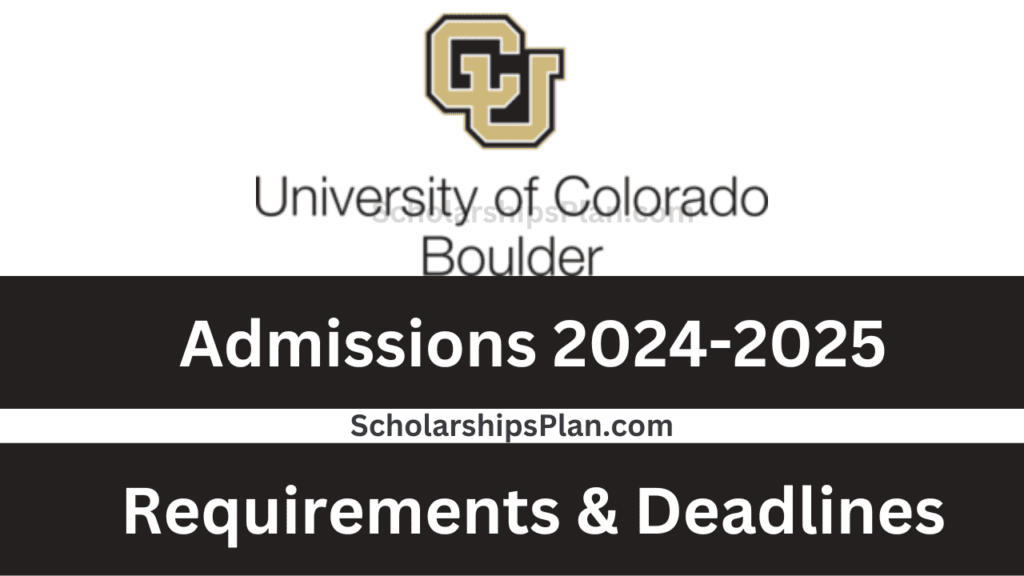The University of Colorado Boulder is a highly selective public university located in one of the most desirable cities in the United States. This article provides an extensive overview of University of Colorado Boulder Admissions 2024 process and requirements for prospective students hoping to join in the year 2024-2025 freshman class.
CU Boulder admission is quite competitive, with an overall acceptance rate of 76% that drops below 35% for elite undergraduate programs like business and engineering. For Applying University of Colorado Boulder Admissions 2024 Applicants will need strong academics, test scores, essays, recommendations and extracurricular activities to stand out. Review important deadlines for early action, regular admission, and financial aid and merit scholarship applications.
While admission to CU Boulder is challenging, accepted students gain access to a world-class education surrounded by incredible mountain landscapes. The Ultimate Guide on University of Colorado Boulder Admissions 2024 provide strategies and statistics to help prospective University of Colorado students submit the strongest application possible this coming admissions cycle.

University of Colorado Boulder Admissions 2024-2025: Best Guide
Introduction
The University of Colorado Boulder is considered one of the top public universities in the United States, known for its stunning campus at the foothills of the Rocky Mountains as well as its excellence in research and academics. As applications open for the 2024-2025 academic year, many prospective students are eager to learn more about the University of Colorado Boulder Admissions 2024 process and requirements.

This comprehensive guide will provide an in-depth look at everything you need to know about University of Colorado Boulder admissions for 2024-2025, from important deadlines to acceptance rates, test scores, and tips for getting accepted. We’ll also overview appeals processes, financial aid and merit scholarships, and more.
Whether you’re starting to prepare your application or have already applied to CU Boulder’s Class of 2024, use this guide to inform your admissions strategy and understand what to expect in the year ahead.
Also Read How To Write a Letter For Scholarship Application ?
Admissions Requirements
To be considered for admissions at the University of Colorado Boulder, you’ll need to meet certain baseline admissions requirements. While specific requirements differ slightly by school and program, here is an overview of the general CU Boulder admissions requirements for freshman applicants:

GPA and Test Scores
- Minimum high school GPA: 2.60 for Colorado residents; 3.00 for non-residents
- Standardized test scores: SAT or ACT scores optional for admission but recommended for scholarship consideration
- Average GPA of admitted students: 3.69 (unweighted)
- Middle 50% test score range: SAT 1200-1460, ACT 25-32
CU Boulder has had a test-optional admissions policy since 2021, allowing students to apply without submitting SAT or ACT scores. However, students who don’t submit test scores will not qualify for merit-based scholarships.
You can also read Scholarships In USA
High School Course Requirements
To apply for undergraduate admission, you must complete the following high school courses as a minimum:
- 4 years of English
- 4 years of math (minimum Algebra 1, Geometry, Algebra 2)
- 3 years of natural science
- 3 years of social science
- 2 years of a single foreign language
- 1 year of an academic elective
Some CU Boulder colleges like engineering have additional math and science course prerequisites. Review major-specific requirements on the CU Boulder admissions website.
Deadlines for Applications
As you put together your application for University of Colorado Boulder, it’s vital to know the different deadline dates and get everything submitted on time.
Here are the upcoming admissions deadlines for 2024-2025 CU Boulder applicants:
- Early Action Deadline: November 15, 2023
- Regular Decision Deadline: January 15, 2024
Meeting these deadlines is essential, as CU Boulder does not accept late applications under most circumstances. We recommend submitting your early action application as close to the beginning of November as possible and your regular decision application in December or very early January.
Also create an account on CU Boulder’s applicant portal so you can track the status of required application materials like transcripts and letters of recommendation. We also advise applying for your FAFSA ID number so you can submit the CSS Profile financial aid application shortly after submitting your CU Boulder application.
Here are the admissions deadlines for applying as a freshman to the University of Colorado Boulder in fall 2024:
| ADMISSION DEADLINES | DATE |
|---|---|
| Early Action Deadline | November 15, 2023 |
| Regular Decision Deadline | January 15, 2024 |
| Early Action Admission Notifications | By February 1, 2024 |
| Financial Aid Application Priority Deadline | March 1, 2024 |
| Regular Decision Admission Notifications | By April 1, 2024 |
Early action candidates hear back about admission decisions ahead of regular decision applicants but do not have to commit to attending CU Boulder. To apply for needs-based financial aid, submit the FAFSA by the March 1st priority deadline. Reservation deposits to reserve your spot are due in early May if admitted.
You Can Apply for University of Colorado Boulder Admissions 2024-25 on their
Application Components
Your complete CU Boulder application includes:
- Common Application or CU Boulder application form
- Official high school transcript
- 1-3 letters of recommendation (varies by school/program)
- 1-2 essays (varies by school/program)
- List of extracurricular activities
Put time into each application component and follow instructions closely. The essays and letters of recommendation provide an opportunity to showcase your unique background, interests, and fit for CU Boulder to admissions officers.
Admissions Statistics and Acceptance Rates
As one of the top public universities in America, the University of Colorado Boulder is quite selective, admitting just over 75% of applicants on average. However, acceptance rates vary significantly across CU’s different schools and academic programs.

Here is an overview of 2023 University of Colorado Boulder admissions statistics:
- Total Applications Received: Over 32,000
- Overall Acceptance Rate: 76%
- In-State Acceptance Rate: 80%
- Out-of-State Acceptance Rate: 68%
In particular, some CU Boulder colleges are far more competitive than others. Here are the 2023 acceptance rates by college:
- College of Arts and Sciences: 84%
- College of Engineering: 63%
- College of Media, Communication & Information: 73%
- Leeds School of Business: 35%
So while getting into CU Boulder is somewhat attainable for in-state students with reasonable grades and test scores, admission into elite programs like business or engineering is very competitive.
Understanding these admissions statistics help you gauge your chances more accurately as an applicant. For example, if you are an out-of-state student hoping to study business, you would need exceptionally strong academics and extracurriculars to get into the Leeds School of Business.
Admissions Decision Notification Dates
Once you submit your full application to the University of Colorado Boulder during the fall of your senior year, the next big milestone is finding out whether you have been admitted in the spring. Here are the notification dates to expect:
Early Action
If you apply early action (deadline November 15th), you will receive an admissions decision by February 1st. With early action, you get your decision early but are not committed to attending CU Boulder if admitted.
Regular Decision
For regular decision applicants who apply by the January 15th application deadline, admission decisions will be released by April 1st.
Some academic programs with additional application requirements like portfolios may notify regular decision applicants later in April. Check your application portal account regularly for updates.
Next Steps If Admitted
If you receive an offer of admission from the University of Colorado Boulder for Fall 2024, congratulations! Be sure to confirm your acceptance and submit any additional required forms and deposits by the deadline stated in your offer letter to secure your spot in the incoming class.
Most admitted students will need to pay an enrollment deposit. You usually have until May 1st (National College Decision Day) to confirm your plans to enroll at CU Boulder. Retrieve your student ID to get access to student systems, learn about orientation, and complete course registration.
Review next steps for admitted students on CU Boulder’s Freshman Admission Page.
Appeals Process If Denied
While getting denied from a top choice university can be disappointing, don’t lose all hope! For some students who are deferred or denied admission to CU Boulder, filing an appeal or getting waitlisted can lead to an acceptance later on.
Appeals Process
If you are denied admission to the University of Colorado Boulder, you have the option to appeal the decision within 2 weeks by sending a written appeal request to the admissions office. Appeals may be approved in cases where new standardized test scores, grades, or other updates to your application could influence the admission decision.
Follow instructions for appeal letters provided in your denial letter or on the CU Boulder website. Focus your appeal on concrete reasons why the admissions committee should reconsider your application.
Deferral Process
If you are not denied but deferred admission and placed on a waitlist, your application will be reconsidered later in the spring or summer for potential admission if spots open up.
You can also send updates on your senior year grades, test scores, or accomplishments for further consideration. Continue demonstrating your interest by visiting campus and connecting with current students and professors.
While challenging, getting off the waitlist or having an appeal approved is possible with a strategic approach. Don’t lose hope!
Scholarships and Financial Aid
Affording the out-of-state tuition and living expenses associated with attending CU Boulder is a concern for many admitted students and families. Thankfully, the University of Colorado provides over $500 million in financial assistance every year. Here is an overview of scholarships and financial aid options:
Merit-Based Scholarships
The University of Colorado Boulder offers prestigious merit-based scholarships at the undergraduate level, mainly focused on recognizing in-state students. These include:
- Chancellor’s Achievement Scholarship: Covers 65-75% of in-state tuition for 4 years. Requires 3.9+ GPA and 29+ ACT score.
- Esteemed Scholars: Covers 25% of in-state tuition for 4 years. Requires 3.75+ GPA and 28+ ACT score.
- Distinguished Scholars: Covers 20% of in-state tuition for 4 years. Requires 3.50+ GPA and 24+ ACT score.
Additional competitive scholarships are available through specific colleges and departments. Learn more about CU Boulder merit scholarships.
Financial Aid
Beyond academic scholarships, CU Boulder offers extensive financial assistance packages for qualifying students through grants, student employment, and loans. In 2022, the average aid package for undergrads with financial need was $21,442 per year.
This included an average of:
- $7,815 in grants and scholarships (free aid)
- $5,864 in student loans
- $2,501 in work-study programs
To apply for needs-based aid, current and prospective students must complete the FAFSA and CU Boulder’s financial aid application every year. Priority financial aid application deadline is March 1st before the academic year begins. However, submit applications as early as possible!
Learn more about financial aid options at CU Boulder here. Eligible students can combine merit scholarships with additional financial assistance.
Tips For Getting Accepted
While no formula can guarantee admission at a top university like CU Boulder, following these tips will help you submit the strongest application possible:

Academics
- Take challenging courses like honors, Advanced Placement, International Baccalaureate to show academic rigor. Enroll in acceleration programs if possible.
- Start preparing early. Strive for a competitive GPA and test scores by end of junior year.
- Highlight an upward grade trend, especially over junior and senior year.
Activities
- Choose a few activities and lead them, instead of briefly participating in many clubs for the sake of college apps.
- Connect activities to academic interests whenever possible. Becoming president of the robotics team looks better for a prospective engineer vs. dance club president.
- Focus on long-term commitments, at least 1-2 years. Avoid listing activities you did for just a couple weeks.
Application
- Start essays early and get feedback from teachers, counselors, or university reps. Revise many times until polished.
- Visit campus and interact with CU students and professors. Meet with admissions officers.
- Apply early action rather than waiting until the January deadline. EA applicants have a higher admission rate.
Gaining admission to CU Boulder is competitive, but taking these proactive measures from freshman year onward will set you up for success!
Conclusion
Applying to college can be an intimidating process, but hopefully this article has helped demystify University of Colorado Boulder admissions for the 2024-2025 academic year and answered any questions on your mind about deadlines, requirements, acceptance rates, financial aid, or strategizing your application.
Here are a few key takeaways:
- Prepare early, striving for a strong GPA and test scores from freshman year onward. Also develop meaningful extracurricular commitments over multiple years.
- While an exceptional in-state applicant has a good shot at admission to CU Boulder, admission rates drop below 35% for competitive majors like business or engineering. Manage expectations accordingly.
- Meet all deadlines for test score submission, applications, and financial aid forms. Priority deadlines are in November and March before senior year.
- Getting accepted is just the first step! Also have a plan to fund your education through scholarships, grants, work study programs and reasonable loans if needed.
Best of luck with your University of Colorado Boulder application! Please visit the CU Boulder admissions website or reach out with any other questions.
FAQ’s
Does CU Boulder require SAT 2024?
CU Boulder is test-optional, meaning you can apply without submitting SAT or ACT scores. However, to be considered for merit scholarships, you still need to send your best test scores.
What is the supplemental essay for University of Colorado Boulder 2024?
CU Boulder does not have school-specific supplemental essays beyond the personal statement and short answers in the Common Application. Some individual degrees like engineering require an additional essay.
Is University of Colorado Boulder hard to get into?
With an overall admission rate around 75%, CU Boulder is selective but not extremely competitive for in-state students with decent grades and test scores. However, programs like business and engineering are much harder to get into, with acceptance rates closer to 35%.
What is the acceptance rate for CU Boulder for international students?
In 2023, the acceptance rate for out-of-state students including international applicants was 68%, compared to 80% for in-state. So admission is somewhat less competitive for U.S. residents.
What is the acceptance rate for CU Boulder 2024?
Full admissions data for the CU Boulder Class of 2028 won’t be released until Spring 2024. However, based on trends, we can expect an overall acceptance rate around 75-80% for fall 2024 applicants.
What GPA is needed for CU Boulder?
The middle 50% of admitted freshmen in 2023 had GPAs between 3.69 and 4.0. For in-state applicants, you’ll likely need around a 3.7 unweighted minimum to be a competitive applicant. Out-of-state applicants should aim even higher for top programs.
Does Colorado Boulder give scholarships to international students?
CU Boulder offers some merit-based scholarships to both domestic and international applicants. However, institutional need-based financial aid is mainly reserved for U.S. citizens and permanent residents.
Does University of Colorado Boulder accept international students?
Yes, CU Boulder welcomes international applicants, who made up 6% of the fall 2022 freshman class. However, admission requirements are slightly higher for non-residents.
Does Colorado Boulder give financial aid to international students?
Beyond limited merit aid, CU Boulder typically cannot provide need-based institutional financial aid to international applicants. You’ll need to demonstrate ability to pay full cost of attendance in admissions process.
Why is CU Boulder’s acceptance rate so high?
Thanks to its scenic location and top-ranked programs, CU Boulder has surging popularity among college applicants. By expanding enrollment rather than lowering acceptance rate, they are trying to admit qualified students who fit.
What GPA do you need for Boulder?
You’ll likely need around a 3.7+ unweighted high school GPA to get into CU Boulder as an in-state applicant. For competitive majors and out-of-state applicants, you’ll need a GPA closer to 4.0 for the best chance of admission.
Is Colorado Boulder hard to get into?
Overall CU Boulder is selective but not extremely competitive, admitting 75-80% of applicants. However, certain colleges like business and engineering are far more difficult to get into. Out-of-state applicants also face lower odds.
Can I get into CU Boulder with a 3.3 GPA?
While not impossible, gaining admission to CU Boulder with a 3.3 high school GPA would be very challenging and unlikely for most applicants, especially in competitive degree programs. Bringing up your GPA and test scores is recommended.
Does CU Boulder accept international students?
Yes, the University of Colorado Boulder welcomes and accepts applications from international undergraduate students. Around 6% of enrolled freshmen are international.
Is SAT required for Boulder?
CU Boulder adopted a test-optional policy so you can apply without submitting SAT or ACT scores. But applicants who don’t send scores won’t qualify for merit scholarships.
Can I get into CU Boulder with a 3.6 GPA?
A 3.6 unweighted high school GPA would make for a decent but not guaranteed application, especially out-of-state or in selective majors. Bringing up your GPA and test scores can help chances.
Why is Boulder Colorado so famous?
Boulder is renowned for its stunning natural landscapes at the foothills of the Rocky Mountains. It also boasts a thriving tech scene, entrepreneurial culture and hundreds of miles of bike trails winding through the city.
Is CU Boulder worth the money?
For in-state students who receive substantial scholarships and financial aid, CU Boulder is very affordable and worth the cost. Out-of-state tuition is quite high but may provide long-term returns if leveraged effectively.
How much is Colorado Boulder tuition?
In-state CU Boulder tuition and fees are around $12,000 annually. Out-of-state tuition soars to $38,000 per year. Room, board and other costs add another $13-15,000+ to the annual total bill.
Is Colorado Boulder prestigious?
With several top ranked programs and global research reputation, the University of Colorado Boulder is considered one of the top public universities and a prestigious institution nationally. US News ranks CU 34th among public schools.
What major is CU Boulder known for?
CU Boulder’s most popoular and highest ranked undergraduate programs include Business, Engineering, Psychology, Political Science, Environmental Sciences and Journalism.
Is it worth living in Boulder?
Thanks to the stunning nature, outdoor recreation, thriving job market and cultural scene, Boulder is consistently ranked one of the best and happiest places to live in the U.S. But the cost of living is quite high.
Is Boulder worth living in?
If you can afford it and appreciate the lifestyle, Boulder offers a very high quality of life. Most residents find the proximity to nature, recreational activities and great economy make Boulder an incredible place to live.
Is University of Colorado Boulder competitive?
While not hyper-competitive like some elite private schools, gaining admission to popular majors at CU like business, engineering and computer science has gotten quite competitive in recent years due to surging applicant numbers.
Does CU Boulder have a high acceptance rate?
No, CU Boulder would not be considered a high acceptance rate school. They admit around 75% of applicants overall, with far lower admission rates for out-of-state applicants and in selective degree programs.
Is Boulder a dry campus?
No, the University of Colorado Boulder allows alcohol consumption on campus for students over 21. While not technically dry, CU has taken steps to promote responsible drinking and curb excessive partying.
